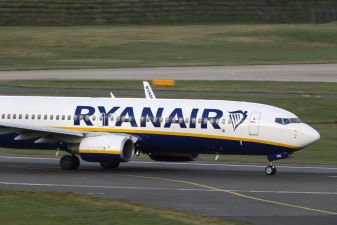The diversion of a Ryanair flight to Belarus, allowing an opposition journalist to be arrested, was a “premeditated breach of all the international aviation rules”, according to the airline’s boss Michael O’Leary.
Ryanair flight FR4978 from Greece to Lithuania on May 23rd changed course to head for the Belarus capital Minsk, escorted by a MiG fighter jet.
Giving evidence to the UK's Transport Select Committee on Tuesday, Mr O’Leary said the flight crew were told by Minsk air traffic control that they had received “a credible threat that if the aircraft entered Lithuanian air space, or attempted to land at Vilnius airport, that a bomb on board would be detonated”.
Mr O’Leary said the captain of the aircraft “repeatedly” asked Minsk air traffic control to provide an open line of communication back to Ryanair’s operations control centre in Warsaw.
“Various excuses came back from Minsk ATC why they couldn’t reach us, (such as) Ryanair weren’t answering the phone, all of which was completely untrue,” he told MPs.
Pilot under 'considerable pressure'
Mr O’Leary said diverted Ryanair flights in that location would normally land in Poland and the other Baltic states, but the captain was put under “considerable pressure” to land in Minsk.
“The pilot was put under, I would say, considerable pressure, not overtly but covertly, with the suggestion that he really should divert and land in Minsk,” he told the committee.
“He wasn’t instructed to do so, but he wasn’t left with any great alternatives.
“He asked for other alternative diversion airports. He was only given Minsk.”
Mr O’Leary said that after the plane landed in Minsk, “a number of unidentified persons boarded the aircraft” who were “carrying video cameras”.
The Ryanair boss said they “repeatedly attempted to get the crew to confirm on video that they had voluntarily diverted to Minsk”, but the crew “refused to confirm that”.
Armed guard
Mr O’Leary added that the passengers and crew were taken to a terminal building under armed guard and held “for a number of hours”.
He went on: “The captain was left on board the aircraft, but every time he left the cockpit to examine either the engines or do a walk around, he was accompanied by an armed guard.
“So it was a very threatening and hostile environment.
“We eventually got the aircraft back out of Minsk after about eight hours.”
Mr O’Leary said there were five passengers missing when the plane took off again.
These were journalist Roman Protasevich and his travelling companion, plus three “unidentified persons”.
'KGB types'
Mr O’Leary said: “We understand from the security agencies that it is likely that they were three KGB types.
“Now whether that was Russian KGB or Belarusian KGB, we don’t know, and we’re not sure there’s much of a difference anyway.
“But this was clearly a premeditated breach of all the international aviation rules, regulations, safety.
“An aircraft was brought down under false pretences using Minsk ATC (air traffic control) and it seems clear that certainly two passengers were removed against their will and forcibly detained.”
Mr O’Leary said: “In my personal opinion, this was a state-sponsored hijacking, there’s no other way to explain it.”
Flying ban
Mr O’Leary told the committee that he was not in favour of the ban on EU and UK airlines flying over Belarus, or Belarusian airline Belavia from operating in the EU or UK, remaining in the long term.
He said: “We cannot have a situation whereby airlines, air travel, our customers and our citizens run the risk of being hijacked and diverted under false pretences.
“But equally, far more UK citizens will be disrupted as a result of long haul flights between the UK and Asia for example now having to fly around Belarus or avoiding Belarusian airspace.

“This is not in our long-term interests as an industry or in our passengers’ best interests.
“We need to have an outcome where the European and the UK authorities, hopefully assisted by international partners, receive appropriate assurances from the Belarusian and/or Russian authorities that this will never happen again.”
He said this would mean air travel could “return to the pre-May 23rd normal, and that our passengers and our citizens are not a) running the risk of being hijacked, or b) run the risk of having massively longer flights or having to detour round countries because of interference by state actors in what are the norms of aviation security and freedom”.







